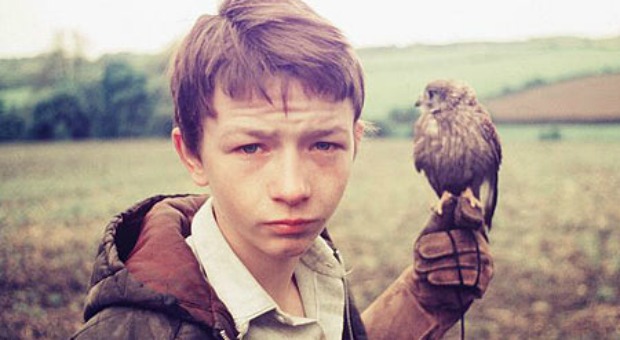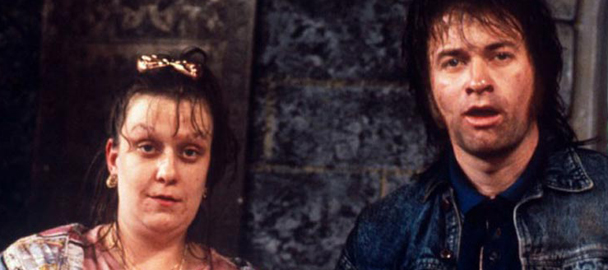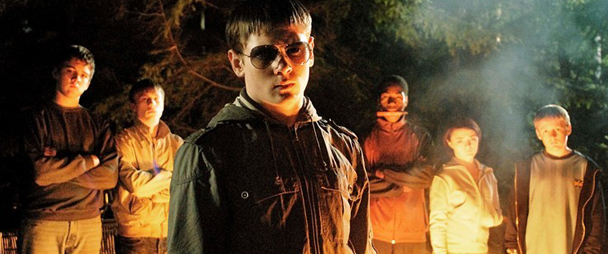
The working-class have been purged from our screens. It’s time to put them back.

It would be easy, but wrong, to get dewy-eyed about a golden age when working-class people were properly respected, let alone glorified. Although working-class people were certainly underrepresented in fiction between the early Victorian era and World War II, there were notable exceptions, like Charles Dickens and Charlotte Bronte: her book Shirley, for example, featured revolts by early 19th century Luddites. But when they did appear, all too often it was as caricatures. Although he was overstating it, there was some truth in George Orwell’s claim that: “If you look for the working classes in fiction, and especially English fiction, all you find is a hole… the ordinary town proletariat, the people who make the wheels go around, have always been ignored by novelists. When they do find their way between the corners of a book, it is nearly always as objects of pity or as comic relief.”
Things did change after World War II. Labour – the party created by working-class people to give them a voice in the political system – had won a landslide victory and was there to stay as one of the country’s two major political forces. Sweeping social forces were introduced to address working-class concerns. Trade unions enjoyed influence at the highest levels of power. Working-class people could no longer be ignored.
“The war changed everything,” says Stephen Frears, a film director who often weaves class themes into his work (from early television serialisations of Alan Bennett plays to the 1985 classic, My Beautiful Laundrette). “Novels started being about the working classes. Plays started being about the working classes. I found all of that very, very interesting. For someone from a middle-class background like Frears, this was a profoundly liberating experience – what he refers to as his “emancipation.” “There was suddenly a whole group of people who’d never been heard before, really… The focus before had been on such a narrow range of subjects in Britain, which was those who live the life of the upper classes or middle classes, whatever. So suddenly the world became more interesting.”
We need a new wave of TV dramas, comedies and films that have working-class life at their heart. That may require a cultural revolution, but it is a revolution that is long overdue
Although there had been there had been TV programmes featuring working-class main characters before, Coronation Street was among the first in which working-class people and their lives were the central focus. Such characters included Ena Sharples, a caretaker, and David Barlow, an apprentice engineer. The series struck a chord and within months attracted over 20 million viewers, riding the wave of so-called Northern Realism, a new genre of film that explored the realities of working-class life.
While working-class people were the starts of favourites like The Likely Lads, it was middle-class people who could find themselves the butt of jokes in The Good Life and other series. There was even a popular sitcom in the 1970s – The Rag Trade – about female trade unionists who took on their bosses and often won. As late as the 1980s there were classic TV shows being written about likeable working-class characters, such as Only Fools and Horses and Auf Wiedersehen Pet.
That’s not to say the portray of working-class life was always terribly realistic. “I think there was an awful lot of romanticization of the working class and their communities, say thirty, forty, fifty years ago,” says historian David Kynaston. “If you think about the portrayals of the working class in the films of the immediate post-war period, often they show working-class people as sort of buffoons, but not as villains or unpleasant. It was more kind of one-dimensional. They might be uncouth, but nevertheless not bad people.” Former Labour leader Neil Kinnock agrees. “For a very, very long time, certainly in much of the twentieth century, the working class was idealized by a small number of very influential intellectuals, people in the arts and education. Otherwise it was patronized.”
With the advent of Thatcherism, things changed. Some of the key pillars of working-class Britain came under attack: trade unions, council housing, industries that sustained many communities, and values like solidarity. A political consensus developed around the idea that everyone should aspire to become middle-class. “The big shift in portrayal is surely – and it’s an obvious point but it’s surely a true point – that from about the 80s, it became possible in the media to, as it were, disparage the working class… in a disrespectful and wholly unkind way,” as popular historian David Kynaston puts it.
Among the earliest example of these sentiments filtering into popular culture were two characters invented by comedian Harry Enfield, Wayne and Waynetta Slob. First appearing in 1990, they could be regarded as “proto-chavs”: feckless, foul-mouthed, benefit-dependent and filthy. When Waynetta (a “nightmare prole”, according to one journalist in 1997) becomes pregnant, for example, the couple debate calling their unborn child “Ashtray”. Even today, the media enthusiastically use Waynetta Slob as a template. “Rising toll of ‘Waynettas’ with three times as many women signing onto sickness benefits under New Labour’ screamed one recent Daily Mail headline. Underneath a photo of a greasy-looking Waynetta Slob holding her baby was the thoughtful caption: “The type of people mocked by Harry Enfield’s character Waynetta Slob have [sic] increased.”

Those labelled “chavs” have frequently been ridiculed for failing to meet lofty middle-class standards in what they wore, or how they ate. Celebrity chef Jamie Oliver was rightly applauded for his crusade to bring healthy food to the British school dinner menu. But it was a campaign marred by tut-tutting at the eating habits of the lower orders. On his Channel 4 programme, Oliver referred to parents who failed to sit around a table for dinner as “what we have learned to call ‘white trash’”. Indeed, his TV series Jamie Oliver’s School Dinners focused on poor estates where mothers struggled to feed their kids with what little money they had. Jonathan Ross joked to him about people living on council estates on his TV show: “Do you think we should put something in the water supply, stop some people having children in future?” It was a ‘joke’ met with cheers.
Reality TV has produced some of the worst examples of “chav-bashing”. Jade Goody came from a particularly impoverished working-class background; her drug-addicted dad was kicked out of the house after hiding guns under her cot. When she first appeared on TV she was labelled a “pig”, she was mercilessly mocked for not knowing what asparagus was (the horror!) and for asking if East Angular was abroad. The media taunted her as a “vile fishwife” and “The Elephant Woman”.
But the tidal wave of anti-Jade hatred was unleashed after an infamous dispute with wealthy Bollywood actor Shilpa Shetty in 2007. It was a much misunderstood dispute. Shilpa suggested that Jade needed “elocution lessons”. When Jade infamously told the Indian actor to “go back to the slums” – a phrase wrongly taken to be racist in intent – she was attacking her for being what Jade described as “a posh, up-herself princess” who should see what real life was like. “Ultimately, we were fighting because we were from different classes,” she would later reportedly claim. “Who the fuck are you? You aren’t some Princess in Neverland,” she screamed at Shilpa when she tried to flush a cooked chicken down a toilet. But while her references to the actor as “Shilpa Poppadom” were undoubtedly stupid and racially-tinged, it was other celebrities who indulged in genuine outright racism.
The media campaign was vicious, to say the least. “CLASS V TRASH” bellowed the Daily Express. The paper slammed “the porcine Jade Goody” and mourned the fact that “Miss Shetty, a huge star in India, has been forced to endure the kind of bullying usually heard around sink estates… We are being disgraced by the likes of semi-literate Jade and her unpleasant associates.” The newspaper was outraged because it felt that a thick, ugly girl from a poor background was attacking a beautiful rich woman. “Jade and her allies clearly feel threatened by the presence of a woman from a very different strata of society from their own,” it claimed. Simon Heffer assailed Goody for indulging in “the only form of bigotry the law now permits to go unpunished: that of hating your social superiors.” He questioned why Channel 4 had to use Big Brother to broadcast the “repulsive aspects” of society “when we can see them so easily for ourselves, if we wish, by wandering on to the nearest council estate for half an hour.”
Wife Swap was another reality TV programme that lifted the lid off class hatred: two wives with different backgrounds swapped families for a coupe of weeks. But it should really have been called Class Swap. Invariably, one of the parties was portrayed as a ‘dysfunctional’ working-class family: feckless, unable to look after kids, bigoted, fag-smoking, beer-swilling and so on. One former fan complained in an internet review that it was guilty of “soon deteriorating into fat uncouth working-class people slagging each other off between cigarettes and swigging canned lager, inviting a more sneering viewer to tune in.”
The Jeremy Kyle chatshow has a similar purpose. Week after week, dysfunctional individuals from overwhelmingly working-class backgrounds are served up as daytime entertainment fodder. Vulnerable people with complex personal troubles are thrown in front of baying audiences: a “human form of bear-baiting”, as one British judge was to describe it. Intensely emotional problems like suspicions of infidelity and “who’s the real father?” scenarios are exploited for the viewer’s vicarious thrills. Little wonder it was lambasted by the Joseph Rowntree Foundation “as a rather brutal form of entertainment that is based on derision of the lower-working-class population.” By portraying them as “undeserving” it undermined support for anti-poverty initiatives, the Foundation claimed.
And then, of course, there’s the comedy chav caricature. Take Little Britain‘s Vicky Pollard, the invention of two wealthy privately-educated comedians, presented as a grotseque caricature of a feckless, debauched white working-class single mother. According to a YouGov poll at the Edinburgh Film Festival, more than 7 in 10 people working in TV thought she was an accurate representation of the white working-class.
Films looking at the reality of working-class life have gone into steep decline, too. In the 1990s there were, of course, films such Brassed Off and The Full Monty: but both marked the supposed passing of an era, featuring a demoralised, defeated working-class. We recently had Made in Dagenham, but we had to be transported back to the 1960s to look at the “glory days” of working-class Britain. Instead we’ve been served up with an abundance of films with sympathetic mostly middle-class characters: just look at the films directed by Richard Curtis, for example.

Perhaps the most disturbing example of “chav-bashing” on our movie screens, however, was horror flick Eden Lake. The plot is fairly simply. An affluent, photogenic couple from London flee to the countryside for a romantic weekend holiday break. When they see that the idyllic Eden Lake is being transformed into gated communities, they make some right-on comments, wondering whom they are trying to keep out. They find out the hard way why the middle classes have every reason to fear the lower orders.
When the couple stand up to some local, semi-feral, aggressive dog-owning kids, they are mercilessly hunted down and tortured. Under the direction of a psychopathic ringleader, the kids use their mobile phones to the film the boyfriend being slashed with knives before his body is burned. But perhaps most disturbing is the role of the parents – waitresses, painters and decorators and so on – who routinely swear and slap their kids about. In a shocking finale, it is they who apparently torture the girlfriend to death after she kills a couple of the ‘chavs’ in revenge.
When I asked the director, James Watkins, for an interview, I was told that he was “very flattered… but he doesn’t want to impose any authorial interpretations on Eden Lake, preferring instead the widely divergent reactions to the film.” But it is difficult to imagine any other interpretation than that of the Sun‘s movie critic, who condemned Watkins’ “nasty suggestion that all working-class people are thugs.” Or, for that matter, the Telegraph’s conclusion that “this ugly witless film expresses fear and loathing of ordinary English people.” One reader of Time Out commented that the film “hits too close to home and will only grow and spread the anger that society holds for the lower classes. I myself and many of my friends have felt the violence from ignorant ‘children’… I have to say this without an ounce of regret if the death penalty ever came to this country… I would support it.”
Working-class life used to have a place on our TV and movie screens: often warts and all, but sympathetically nonetheless. But today, if working-class people appear at all, it is all too often as caricatures to sneer at or attack. It is symptomatic of a country where working-class pride is belittled: after all, we’re all supposed to be aspire to be middle-class. Much of TV and media as a whole have been turned into closed shops for the privileged, where people from working-class backgrounds are prevented from gaining access. We need a new wave of TV dramas, comedies and films that have working-class life at their heart. That doesn’t mean the opposite: glorifying people simply because they’re working class, or turning people into saints, but rather showing the complexities of everyday life. That may require a cultural revolution, but it is a revolution that is long overdue.







COMMENTS